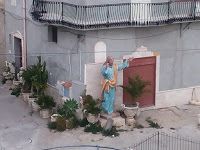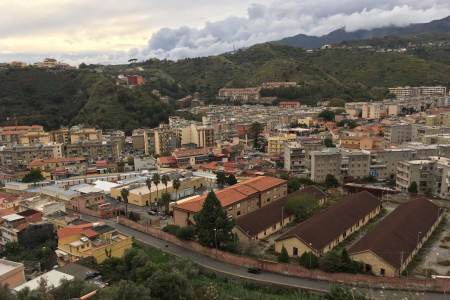Visiting the CAS of Pergusa
Last Saturday we
went to one of the three CAS* of Pergusa, a district of the city of Enna,
distancing about five kilometers from the centre. We visited the CAS managed by
the cooperative ‘Ippocrate’, in a huge facility built in 2004 for becoming a
rehabilitation clinic, which, though, in all these years has never been run as
such. Hence, since a few months back, it has been converted into a centre for
extraordinary reception.
Through a
concession agreement of the prefecture, the facility currently hosts 19 asylum
seekers and it will participate in the call for new places regarding the
concession for a total of 75 hosting places next September.
At our arrival we
met about ten of these guests, all vey young and coming from Ghana, Nigeria, and
Burkina Faso. They arrived at this centre last May 14, after spending a week at
the CPSA** of Lampedusa. We inquiry about their impression on the services of
the facility and immediately learn that, also in this centre, the food is
reason for dissatisfaction. It is not really appreciated and in scarce
quantity. Meals are provided by a catering company that does not deliver ready
meals, but rather makes available one of its employees who goes to the centre
for cooking at the internal canteen, supervised by one of the guests who assists
in preparing the dishes. Regarding the medical assistance they tell us they
refer to a local doctor of Pergusa, to whom they go in case of necessity –
always accompanied by a member of staff. They all have been provided with a
public health insurance card.
They never had a
meeting for legal counseling, but from time to time they received information
regarding their legal status, the commission and documents from the son of the center
manager who is responsible for all which pertains to bureaucratic matters and
general information. Thus, they affirmed that there is nothing to complain
about regarding these matters. However, they highlighted the problem of the
unbearable heat that can’t even be alleviated by opening the windows, because
otherwise mosquitos, which abound in this lake area, would invade the rooms.
They told us that they asked the management for mosquito nets, but they have
been told to buy them with their own money.
They got the same answer when asking to have at least a ventilator. And
so, at the moment, they have difficulty to sleep at night but also to remain
awake, because in the evening also all other common rooms of the facility
become full of mosquitos.
They then told us
that one of the criticalities regarding their stay at the centre is the problem
of not knowing what to do. They would like to go more often to the city centre
of Enna, but it is too expensive to pay for the bus tickets. To hang around in
the periphery of Enna is boring, there is nothing to do and no one to talk to,
and they also feel a kind of mistrust towards them from the local people.
Therefore, most of the time they prefer to stay at the centre among themselves.
They would like to have at least some activities to do, considering that at the
moment the only thing they can do is the Italian language course, which is
divided into two levels and guaranteed three times a week for four hours.
Almost the end of
our visit we have the opportunity to talk to the son of the manager of the
centre, who was very helpful and gave us additional information regarding the
centre. Hence we are informed that of the 19 people currently staying at the
centre four are women and there are two entire families. When we highlight some
of the shortages that we noticed he explains that the centre is still in a
phase of transition, waiting for the official enlargementprocess after which,
once they are officially appointed the management for a total of 75 hosting
places (the facility is very big and at the moment there are many empty rooms),
further services will be activated among which a 24 hours medical office.
He further explains
that the current team is formed by three language/cultural mediators and that
his father, a psychologist, guarantees the psychological assistance and has
already managed to write reports on each of the guests. Afterwards he shows us
some of the rooms for three or four people – rooms that appear discrete, even
if not particularly clean. A member of staff cleans the rooms once a week.
Furthermore there is also a laundry service. Besides, there is a canteen room,
which functions also as common room that has Wi-Fi and a TV.
Before leaving
the centre the young guests ask us once again to bring to the centre some
activities or indicate them places where they can spend their time. Being aware
that they do not have the right to work, they would like to use this time while
waiting for their hearing at the commission by learning to do some activities,
meet new persons, not extinguishing as persons.
Giovanna Vaccaro
Borderline
Sicilia Onlus
*CAS – Centri d’Accoglienza
Straordinaria: Centres for Extraordinary Reception
**CPSA – Centro di Soccorso e prima Accoglienza: Primary care and first
reception centre
Translation:
Chiara Guccione


